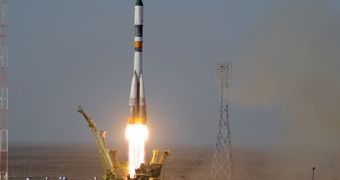Tomorrow, October 30, the Russian Federal Space Agency (RosCosmos) will be sending another unmanned space capsule to the International Space Station. This is the first Progress to launch in space after the failed August 24 mission, and the very continuation of ISS operations depends on it.
About two months ago, on August 24, the Progress 44 capsule was destroyed when its carrier rocket failed to reach orbit, and crashed into the ocean. At that time, the ISS crew in space still had sufficient supplies to avoid having to abandon the orbital lab, but that is no longer the case now.
As such, the success or failure of the Progress 45 spacecraft may very well determine whether Expedition 29 astronauts will remain in space, or will have to abandon the installation due to lack of supplies, Space reports.
At the same time, another failure would have even more extensive implications. RosCosmos uses the same type of Soyuz rockets to launch both its unmanned Progress spacecraft and the manned Soyuz space capsules. Another failure with the delivery system will affect the manned program as well.
At this point, three ISS crewmembers are scheduled to launch to space on November 14. Only three astronauts occupy the station at this time. They were supposed to be joined by their colleagues some time ago, but the failure of Progress 44 forced RosCosmos to delay the mission.
Now that an extensive review of the August 24 accident has been completed, RosCosmos decided to launch Progress 45 and the new Soyuz mission. The investigation concluded that the issues which caused the Soyuz rocket to fail pertained to faulty quality check controls, not the vehicle itself.
Progress 45 will launch from the Baikonur Cosmodrome, in Kazakhstan, at around 6:11 an EDT (1011 GMT). According to RosCosmos officials, any glitch in the Soyuz rocket would cause the ISS to remain without a permanent crew for the first time in 10 years.
If something out of the ordinary is discovered, the November 14 Soyuz launch will be delayed. Any delay exceeding five days would see the ISS losing its permanent crew. The three astronauts currently aboard the space lab are scheduled to return to Earth on November 22.
“The Soyuz FG booster used to launch the Soyuz TMA crew vehicles is a variant of the Soyuz U which experienced the failure. Its launch resumption will be dependent on the successful Soyuz U launch of Progress 45P on October 30th,” Thomas Stafford said earlier this month.
The official is the chairman of the NASA International Space Station Advisory Committee. He made the statement for the House of Representatives' Committee on Science, Space and Technology, which controls NASA funding.

 14 DAY TRIAL //
14 DAY TRIAL //